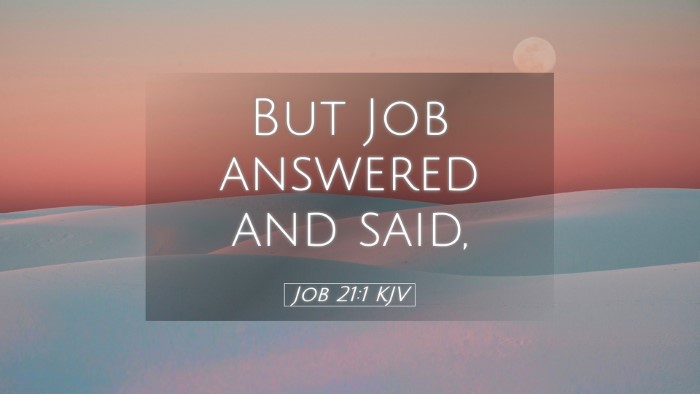Commentary on Job 21:1
Job 21:1 reads, "Then Job answered and said," indicating a continuation of the discourse between Job and his friends who have accused him of wrongdoing. In this verse, Job starts his response, countering their accusations with his own observations about the prosperity of the wicked.
Context and Background
The book of Job delves into the intense suffering endured by a righteous man and the dialogue surrounding the nature of suffering, justice, and divine sovereignty. The preceding speeches by Job’s friends suggest that they believe suffering is a direct result of personal sin. Job’s challenge is to assert his innocence despite his afflictions.
Insights from Matthew Henry
Matthew Henry emphasizes the posture of Job’s heart in this speech. He notes that Job engages with his friends not in bitterness but in a desire to discuss the pressing issues of justice and the condition of the ungodly. Henry suggests that Job's direct address reflects a commendable honesty about his plight and a deep understanding of the human condition.
Henry writes, 'Job felt the weight of his misery, but he was resolved to confront it with reason and truth.' This insight is crucial for understanding how believers are called to face suffering—not with despair but with a commitment to seek truth.
Insights from Albert Barnes
Albert Barnes provides a critical analysis of Job’s argument regarding the apparent prosperity of the wicked, reflecting on the nature of their lives. Barnes points out that Job is making a philosophical and theological inquiry into why the righteous suffer while the wicked often flourish. He remarks, 'The instances of prosperity among the wicked are sometimes more striking than the sufferings of the righteous; this is a profound mystery.'
Barnes elaborates that Job’s inquiry is not merely lamentation but a challenge to the simplistic theology of retribution espoused by his friends. He argues that this indicates a broader question about divine justice that requires deep theological reflection. It suggests that understanding suffering necessitates grappling with the complexities of the divine economy.
Insights from Adam Clarke
Adam Clarke adds a nuanced interpretation of Job's assertion in this verse. He interprets Job’s statement as a call for attention to his arguments and points out that Job’s tone shifts from despair to a reasoned challenge. Clarke emphasizes that Job’s words represent a crucial turning point in his dialogue, 'Wherein he demands to know the reason for his suffering, if indeed he is guilty of no grievous sin.'
Clarke posits that Job's response serves as an indictment against the friends' assumptions about suffering and piety. He encourages readers to reflect on God’s justice and the nature of true piety, suggesting that outward circumstances do not always align with inner righteousness.
Theological Implications
Job 21:1 invites deep theological reflection. It challenges readers, especially pastors and theologians, to consider the complexities of suffering and the nature of God’s justice. The dialogue prompts an exploration of various theological themes, including:
- The Mystery of Suffering: Job’s plight resonates with anyone facing unexplained suffering, prompting questions about divine justice.
- The Prosperity of the Wicked: This verse questions the traditional belief in retributive justice, which posits that good is always rewarded and evil punished in this life.
- Human Integrity and Divine Love: Job refuses to relinquish his integrity and insists on God's fairness, illustrating the depth of faith amidst trials.
Conclusion
Job 21:1 is pivotal in Job’s discourse, highlighting the profound challenges of faith in the face of suffering. Insights from Matthew Henry, Albert Barnes, and Adam Clarke provide a robust framework for understanding this complexity. Ultimately, this verse beckons a deeper exploration of the nature of suffering, divine justice, and the steadfastness of faith in the face of adversity. For scholars and theologians, it presents an ongoing discourse on the intersection of faith, moral integrity, and the realities of life’s injustices.


